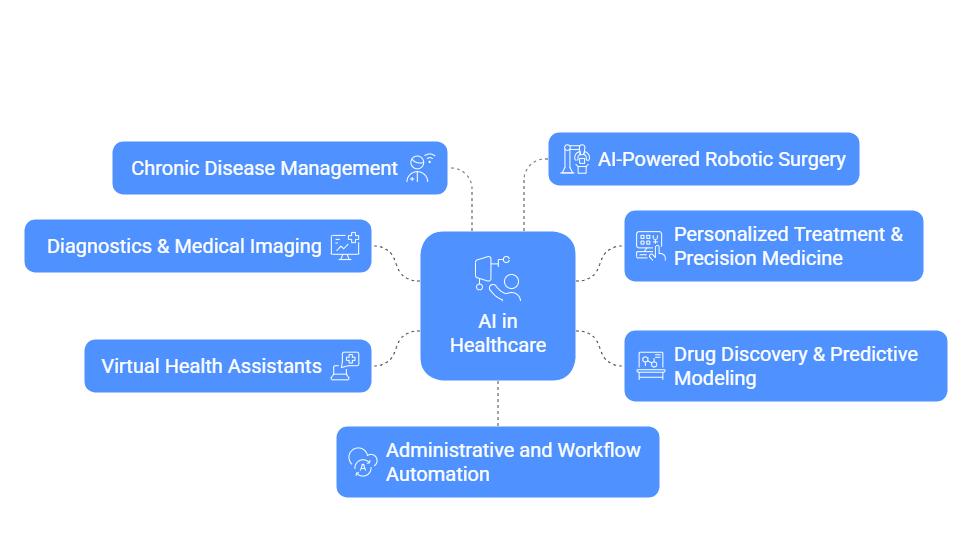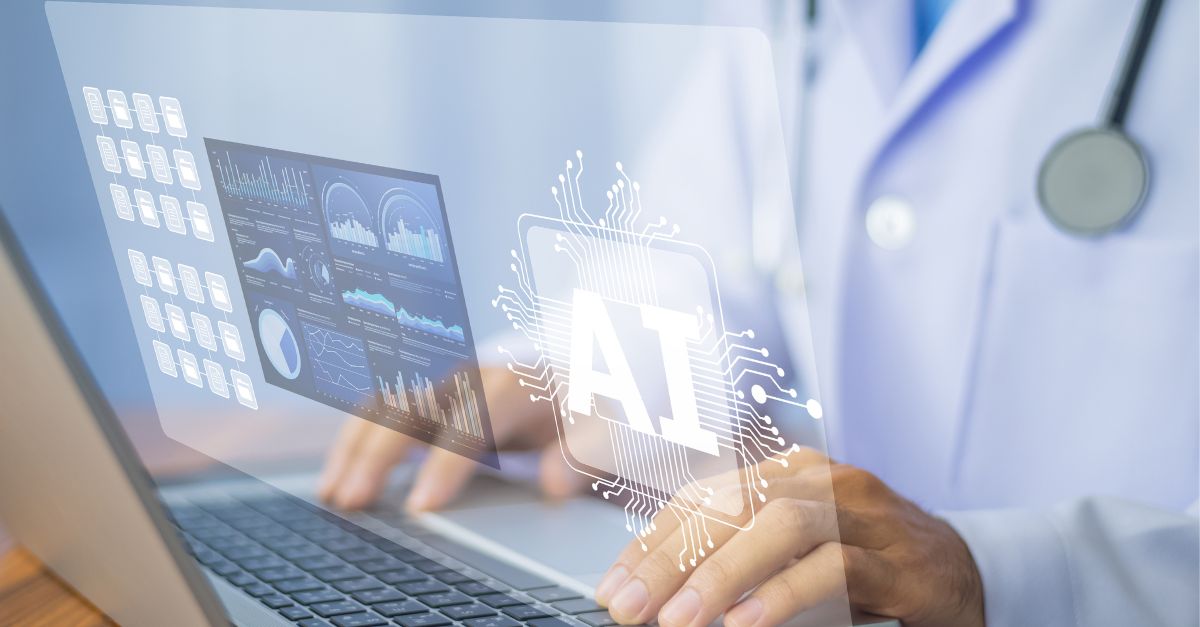Artificial Intelligence (AI) is more than just a global trend – it is the basic and fundamental technology which shapes healthcare. A combination of intelligent diagnostics, minimally invasive surgery, and administrative automation constitutes the AI projects in healthcare which are not only reactive but also preventive and customized.
AI development companies, the management of hospitals, and healthcare entrepreneurs who are thinking of going digital need to employ the right AI team in order to thrive in the future. It has now become a strategic need in terms of the requirements of the future, operational efficiency, and the patient’s results.
AI in Healthcare: A Strategic Overview
AI in healthcare is a concept where a combination of machine learning, deep learning, natural language processing (NLP), computer vision, and robotics is used in healthcare systems and processes to improve quality and efficiency. These technologies help medical professionals, administrative staff, and patients by providing them with added intelligence and the ability to make quicker and more reliable decisions, thus freeing them from the routine and mundane tasks and allowing them to process important information from very large sets of different types of data.

Key Areas Where AI Is Transforming Healthcare
Diagnostics & Medical Imaging
AI algorithms trained on thousands of medical images can detect abnormalities such as tumors, hemorrhages, or fractures with remarkable accuracy. In many cases, AI outperforms human radiologists in speed and consistency. Deep learning models are now used in radiology, pathology, and dermatology to provide second-opinion support to clinicians.
Personalized Treatment & Precision Medicine
AI enables individualized treatment plans by analyzing genetic profiles, medical histories, lab results, and lifestyle data. This approach—known as personalized medicine with AI—enhances treatment efficacy while minimizing adverse effects.
Drug Discovery & Predictive Modeling
Traditional drug development can take years and cost billions. AI shortens this lifecycle by predicting molecule behavior, identifying drug candidates, and optimizing clinical trials. By using predictive analytics in health, pharmaceutical companies and biotech startups are fast-tracking innovation.
Virtual Health Assistants
AI-powered bots provide 24/7 support through chat, voice, or mobile apps. These virtual health assistants handle scheduling, medication reminders, symptom checking, and patient education, freeing up healthcare staff for more critical tasks.
Chronic Disease Management
AI continuously monitors patients with chronic illnesses like diabetes, COPD, or heart failure using wearable devices, IoT sensors, and EHRs. Real-time data allows providers to intervene early and reduce hospitalizations.
AI-Powered Robotic Surgery
Surgical robots equipped with AI provide unmatched precision and minimal invasiveness. These tools reduce human error, enable remote surgeries, and improve post-operative outcomes.
Administrative and Workflow Automation
Healthcare facilities spend vast resources on billing, coding, scheduling, and documentation. AI automates these tasks, reducing errors, improving compliance, and boosting operational efficiency.
Benefits of AI-Powered Healthcare Innovation
By aligning with an experienced AI development company for healthcare, organizations can unlock a range of strategic and operational benefits:
Diagnostic Accuracy and Speed
Machine learning in hospitals helps identify diseases earlier, more accurately, and with less resource strain. AI improves the consistency of diagnoses, especially in overburdened systems.
Improved Patient Outcomes
With smarter tools and data-backed decisions, providers can deliver proactive, tailored care that improves survival rates, recovery times, and overall patient satisfaction.
Cost Optimization
AI reduces the need for redundant testing, manual data entry, and administrative oversight—helping hospitals save millions annually while enhancing service delivery.
Operational Efficiency
AI optimizes staffing, automates repetitive tasks, and ensures better resource utilization across departments—from emergency rooms to billing offices.
Expanding Access to Care
AI bridges the urban-rural healthcare divide. Through telehealth and virtual assistants, it enables remote diagnosis, monitoring, and consultation-especially in underserved regions.
AI Healthcare Trends Shaping the Future
Healthcare innovation is accelerating. As technologies mature, several AI healthcare trends are emerging as game-changers:
Next-Generation Diagnostics
AI’s role in radiology, genomics, and pathology is growing. These technologies are enhancing early detection, diagnostic accuracy, and treatment planning.
Automation of Backend Operations
AI bots are automating tasks like claims processing, audit trails, and compliance reporting, resulting in faster reimbursements and lower overheads.
Healthcare Robotics Expansion
AI-driven surgical and service robots are reducing complications, speeding up surgeries, and delivering medicines or supplies in smart hospitals.
Intelligent Healthcare Data Analysis
Massive healthcare datasets (EHRs, lab data, imaging, wearables) are being mined using AI for insights into population health trends, outbreak prediction, and precision care strategies.
AI in Clinical Workflows
Clinicians are using AI-based tools for symptom analysis, diagnostic decision support, treatment optimization, and patient risk stratification-saving time and improving care.
Connected and Remote Care Ecosystems
IoT and AI work together to deliver connected care. Smartwatches, fitness bands, and home monitoring tools track health indicators and send real-time alerts for early intervention.
Challenges to AI Adoption in Healthcare
Despite the enormous potential, integrating AI into healthcare systems presents some unique hurdles:
Data Privacy & Regulatory Compliance
Health data is highly sensitive and subject to strict regulations (HIPAA, GDPR). An AI development partner must ensure end-to-end compliance and data governance.
Bias and Fairness in AI
AI systems trained on non-representative data can make biased predictions. Healthcare organizations must work with vendors who emphasize ethical AI and use diverse, inclusive datasets.
The Role of Human Oversight
AI is a support tool, not a replacement. Doctors must always have the final say in critical decisions. Clinical AI systems should be explainable and transparent.
Cost and Technical Complexity
AI implementation requires significant upfront investment in infrastructure, training, and change management. The right vendor can minimize these costs and deliver quicker ROI.
Integration with Legacy Systems
Most hospitals use legacy software and fragmented EHR systems. Seamless AI in clinical workflows requires expert engineering, APIs, and robust interoperability protocols.
Why You Need an AI Development Company for Healthcare Innovation
The road from concept to successful AI deployment is complex-but an experienced AI development company can accelerate the process and reduce risk.
Here’s what a trusted AI partner brings to the table:
Customized AI Solutions
From clinical decision support to imaging analysis, the best companies tailor solutions to your specific needs, specialties, and workflows.
Healthcare Data Engineering
They design secure, scalable pipelines for managing and processing structured and unstructured data, including lab results, notes, images, and wearable data.
Domain-Specific Expertise
A healthcare-focused AI partner understands medical terminology, compliance standards, and real-world workflows-ensuring smoother deployment.
Interoperability & Integration
Experienced vendors offer integration with EHR platforms, cloud infrastructure, APIs, and mobile apps to enable seamless operation.
Scalable Infrastructure
Whether you’re piloting a small project or launching a full transformation, the right development company can grow with your needs.
What the Future Holds: Vision, Reality, and Readiness
The future of AI in healthcare is incredibly promising. Key developments over the next 5–10 years include:
- Predictive, Preventive, and Personalized Care
AI will shift the care model from reactive to proactive by spotting diseases before symptoms even appear. - Always-On Virtual Health Assistants
Patients will receive consistent, AI-driven support throughout their care journey—from appointment booking to post-discharge care. - Transparent, Ethical, and Explainable AI
Governments and regulatory bodies will enforce standards for fairness, explainability, and transparency—fostering greater trust. - Global Healthcare Equality
Mobile-based AI applications will empower low-resource regions with diagnostics, triage, and teleconsultation—narrowing the care gap.
Final Thoughts: AI Is the Future—Are You Ready?
AI isn’t just a technological upgrade—it’s a paradigm shift in healthcare delivery. From early diagnosis and virtual assistants to personalized care and administrative automation, the opportunities are vast.
Healthcare leaders who adopt AI early—guided by the right AI development company for healthcare—will drive innovation, reduce costs, and dramatically improve patient outcomes.
Ready to Build the Future of Healthcare with AI?
At Venture7®, we help healthcare providers harness the power of artificial intelligence to improve outcomes, reduce costs, and drive innovation. From clinical AI to automation, we deliver tailored, compliant, and scalable solutions.
Explore our AI Development Services for Healthcare
Book a Free Consultation with Our AI Expert
Frequently Asked Questions About the Future of AI in Healthcare:
1. What role will AI play in the future of healthcare?
AI will serve as a critical enabler of next-generation healthcare technology, transforming the industry from reactive to predictive. It will enhance everything from diagnostics and treatment personalization to administrative efficiency and chronic disease management. AI will also support real-time decision-making in clinical settings, streamline hospital operations, and extend access to care in underserved areas.
2. How will AI technology boost the healthcare industry?
AI technology will boost the healthcare industry by:
- Automating time-consuming tasks like billing, coding, and documentation
- Reducing diagnostic errors through machine learning in hospitals
- Accelerating drug discovery with predictive algorithms
- Enhancing AI in clinical workflows for faster and more accurate care delivery
- Enabling telemedicine and remote monitoring for greater accessibility
By integrating AI, healthcare systems can improve efficiency, reduce costs, and enhance the overall quality of care.
3. How is AI improving patient outcomes and experiences?
AI is improving patient outcomes by enabling early disease detection, tailored treatment plans, and proactive care. It also enhances patient experiences through:
- Virtual health assistants that offer 24/7 support
- Personalized health recommendations using AI-driven data analysis
- Faster appointment scheduling and symptom triaging
- Real-time monitoring for chronic conditions, reducing hospital readmissions
These innovations contribute to improved satisfaction, safety, and engagement across the patient journey.
4. How will AI revolutionize healthcare in the future?
AI will revolutionize healthcare by making it:
- Predictive: Detecting health risks before symptoms appear
- Personalized: Tailoring treatments based on genetics and lifestyle
- Preventive: Alerting clinicians to potential complications early
- Accessible: Providing virtual consultations and diagnostics in remote areas
With support from a skilled AI development company for healthcare, medical institutions can evolve into intelligent ecosystems powered by real-time data, automation, and decision intelligence.
5. How does generative AI help in the healthcare industry?
Generative AI helps in healthcare by:
- Summarizing patient records and generating clinical documentation
- Assisting in medical report generation and image annotation
- Creating personalized health education materials
- Simulating clinical scenarios for training and research
This form of AI enhances productivity, reduces physician burnout, and supports AI-powered healthcare innovation across diagnostics, administration, and education.
6. How can AI be used to improve the healthcare industry?
AI can improve the healthcare industry in several impactful ways:
- Predictive analytics in health to anticipate outbreaks and complications
- AI automation tools to reduce paperwork and manual errors
- Enhanced decision-making through real-time clinical support
- Personalized care pathways with data-driven insights
- Streamlined operations through smart scheduling, inventory, and patient flow management
Ultimately, AI empowers healthcare leaders to deliver better, faster, and more efficient care at scale.





